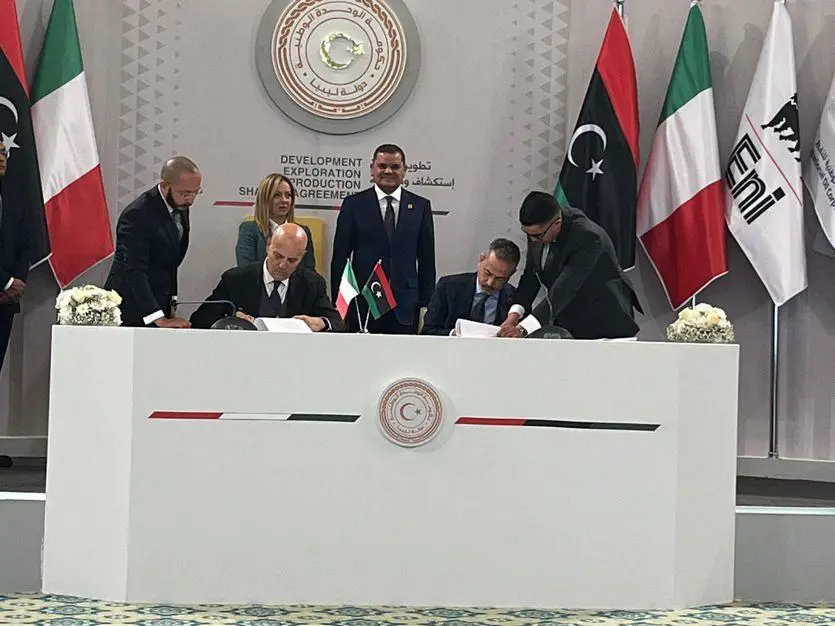Italy’s Prime Minister, Giorgia Meloni, recently visited Libya to meet with the country’s Prime Minister Abdulhamid Dbeibah. The trip was an opportunity to address the two most pressing issues facing Italy and the European Union: energy and migration. During her visit, the largest single investment in Libya’s energy sector in over 20 years was signed, worth US$8 billion.
ENI CEO, Claudio Descalzi, signed the deal with Libya’s National Oil Corporation (NOC) to develop two offshore fields in Block NC-41, north of Libya. The deal is estimated to start pumping gas by 2026 and reach 750 million cubic feet per day. Meloni called the deal “significant and historic” and said it would help secure Europe’s energy sources.
Eni said it was the first major project in Libya since early 2000 and involved the development of two offshore gas fields.
The project includes two gas fields, called “Structure A” and “Structure E” respectively, located in contractual area D, off the coast of Libya.
“The combined gas production from the two structures will start in 2026 and reach a plateau of 750 million of standard gas cubic feet per day,” Eni said in a statement.
“Production will be ensured through two main platforms tied in to the existing treatment facilities at the Mellitah Complex,” 80 kilometres (50 miles) west of the capital, it added.
“The project also includes the construction of a carbon capture and storage (CCS) facility at Mellitah, allowing a significant reduction of the overall carbon footprint,” the company added.
“The overall estimated investment will amount to $8 billion, with significant impact on the industry and the associated supply chain, allowing a significant contribution to the Libyan economy.”
Consolidation of Eni’s investment in Libya
Eni’s Descalzi added that the agreement will make it possible to make important investments in the energy sector in Libya… “contributing to the development and job creation in the country, and strengthening Eni’s position as the leading operator in Libya.” Eni has an 80 percent share of Libya’s gas production.
However, the deal has the potential to deepen the rift between the rival Libyan administrations in the east and west. It also exposes factions within Dbeibah’s government, as the country’s Oil Minister, Mohamed Aoun, criticized the deal as “illegal” and said his ministry was not consulted. NOC’s chairman, Farhat Bengdara, did not address the criticism, but instead said that those who reject the deal can challenge it in court.
Migration being a top concern in Meloni’s trip
Another issue of concern for Italy and Meloni during her visit was migration. The presence of Piantedosi, the head of the Italian coast guard, during the trip signaled the importance of migration. Italy pledged to provide five “fully equipped” boats to Libya’s coast guard to help stem the flow of migrants. However, the activist network, Alarm Phone, criticized Italy’s move, saying it will lead to more people being abducted at sea.
Despite the hot migration issue, the deal is expected to provide a much-needed boost to the Libyan economy, which has suffered in recent years due to conflict and political instability. The development of the offshore fields will create jobs and provide investment in the country, helping to spur economic growth. Additionally, the increased production of oil and gas is likely to result in higher revenue for the Libyan government, which will in turn help to finance much-needed public services and infrastructure projects.
Improving Energy Security for Libya
The deal with ENI will also help to improve energy security in Libya. With the increased production of oil and gas, the country will become less reliant on imports and will have greater control over its energy resources. This will give the government more power and independence in the global energy market, which will benefit the country in the long term.
The deal between ENI and the NOC will also foster international relations between Libya and Italy. The two countries have had a long and complex history, but the energy deal marks a new chapter in their relationship. By working together on this project, the two countries can strengthen their ties and increase their cooperation in other areas. This will help to build a more stable and secure future for both countries.
One of the key components of the deal is the development of two offshore gas fields in Block NC-41, north of Libya. This will lead to a significant upgrade of energy infrastructure in Libya, which in turn could benefit neighboring countries if they share energy resources. This could help address the energy deficit faced by many African countries, providing a much-needed boost to their economies.
The energy deal is expected to create thousands of jobs in Libya, which could have a ripple effect on neighboring countries. As more international companies look to invest in the region, job opportunities are likely to increase, providing much-needed employment to the local population.

